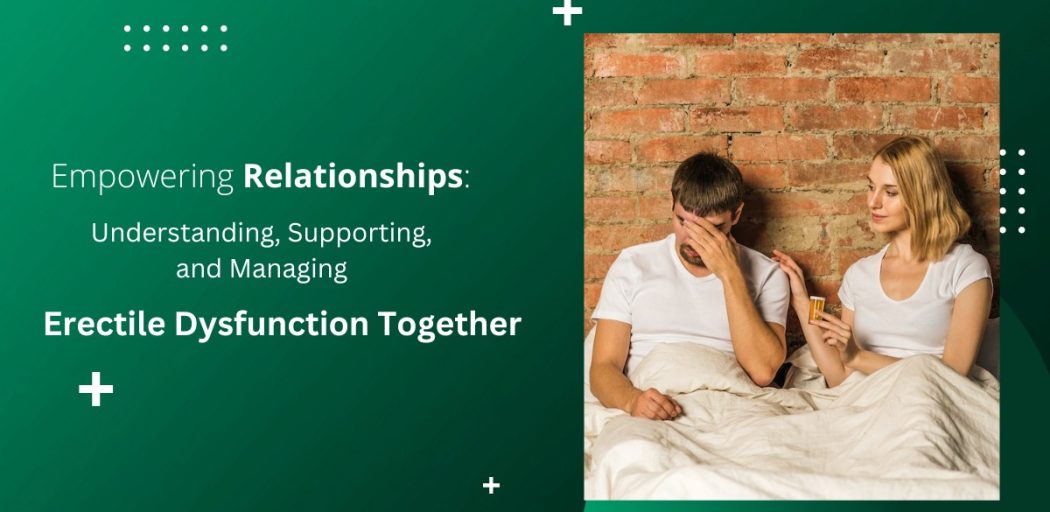Introduction:
Erectile dysfunction (ED) can be devastating for men, affecting their relationships, quality of life and well-being in general. In this article, ED and the two sides, the impact of ED on the sexual lives of the involved people and how to handle it as a partner, tips on supporting an individual to stay hard when ED arises, and identifications of the difference between psychological and physical causes of ED will be discussed.
What is the role of erectile dysfunction in your relationships or with your sex life?
1. Psychological Impact:
Learning that one cannot accomplish or have sustained an erection can make people feel insecure and frustrated and have low self-esteem.
The intensity of anxiety and performance pressure might be increased, which eventually bridges the gap to further sexual issues and connection breakdown.
2. Relationship Challenges:
This should lead to strain airing in relationships, which will, in turn, result in communication barriers, less intimacy, and lower levels of dissociation between the partners.
Firstly, your partner may experience feelings of perplexity, remorse and hatred, which, in turn, affect their whole attitude towards you as a companion.
3. Sexual Satisfaction:
It may be hard to achieve erections, which can affect the dimensions of the relationship, including a decrease in sexual satisfaction for both individuals.
What to do with your partner who has erectile dysfunction?
Empathy, effective communication, and a teamwork mindset are essential components of a partner’s erectile dysfunction management.
1. Encourage Open Dialogue:
Develop a comfortable setting that is free of any prejudice or accusation and where everyone can air their thoughts on ED. Make sure to listen actively to your partner’s feelings and emotions as well as their experiences associated with ED.
2. Seek Professional Help:
Reinforce your partner to seek the help of a medical professional or urologist for a detailed diagnosis followed by a specific treatment course. Propose that you attend your partner’s medical appointments to support him/her and find out about medical options together.
3. Explore Alternative Intimacy:
Allocate attention to multiple meanings of intimacy and ways of receiving pleasure beyond penetration, which involves sensual massage, oral pleasuring, mutual investigation, and interlinked emotions. Maintain some form of physical closeness and affection outside of the sexual realm to go on cultivating intimacy.
4. Be Patient and Understanding:
Cognize the fact that ED is a multifaceted problem where it displays physical, psychological, and emotional components. Direct pressure and expectations on sexual performance should be avoided, and make sure that besides that, there is emotional connectivity and mutual support.
How to keep him going in case of erectile dysfunction?
Background The ED sufferer what it takes to stay firm includes knowing how to understand their demands and where to identify their preferences from available treatment options. Here are some strategies:
1. Communication and Feedback:
Help to build up communication with sexual representatives and to get tips about what is good and what isn’t.
Positive reinforcement and praising efforts will help diminish uncertainties and boost self-confidence.
2. Explore Sensual Techniques:
Try a wide range of sensual methods I., e., making foreplay last longer, erotic massage, and more to create arousal and also help erection.
3. Consider Medical Interventions:
You and your partner can discuss the medical interventions with your physician, including oral medications (e.g., Viagra, Cialis), vacuum erection devices, intra-cavernoma injections, or inflatable implants, depending on the determined effectiveness and suitability. Encourage your partner to stick to carefully planned treatment regimens and follow-up visits. From: Mental Health
4. Manage Stress and Anxiety:
Guide your partner in managing stress and anxiety through relaxation techniques, mindfulness practices, regular exercises, and well-thought-out coping skills. Immerse the couple in the ambience, which is serene and soft, pressure-free, and free of distractions.
How is it possible to know if my ED is psychological or not?
It could not be obvious, but it is necessary to differentiate psychological and physical reasons for ED to facilitate due treatment.
1. Psychological Causes:
Psychological triggers for ED are pretty likely if it happens sporadically or in selective situations, such as during a sexual encounter with a specific person, or during stressful times.
Emotional components like anxiety, depression, performance pressure, love relationship problems or past emotional trauma may constitute the leading cause of psychological ED.
In a scenario of morning impotence or impotence during masturbation, the distinction in partnership sex may be mental.
2. Physical Causes:
ED, which is ever-present regardless of the environment or the person and that is co-occurring with other symptoms (like loss of libido or experience of any change in penis sensation), could be caused by some physical disorders.
Diseases like diabetes, cardiovascular, hormonal imbalances, or neurological disorders and also side effects of medication can invariably provoke physical ED.
As normal parts of the body age, physical changes may include reduced blood flow or nerve damage, which can also contribute to physical ED.
Conclusion:
Empowering relationships in the context of erectile dysfunction can be summarized as acknowledging the impact of ED on patients and their partners, cultivating open communication, seeking guidance from a health professional, exploring other ways of intimacy and providing support and empathy. Sharing the burden of ED and working out the psychological difficulties and underlying physical causes through the togetherness of the couple could bring lots of resilience, compassion, and mutual support to overcome sexual problems.

